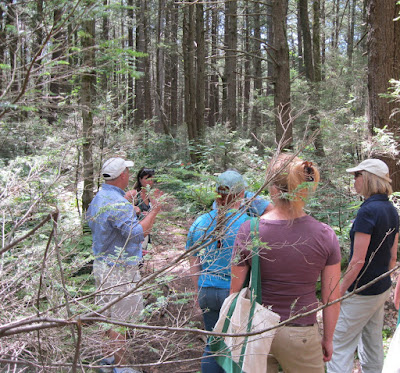Here's What We are Planning for the January 9th Workshop at Harvard Forest
 |
HF Ecologist, Betsy Colburn will lead a presentation and work session to help teachers look more deeply
|
Choate-Rosemary Hall Teacher Joe Scanio will lead a new breakout session where teachers can practice creating visualizations of their Schoolyard Eco. data using Tableau.
Woolly Bully Teachers Will Work with Project Ecologist
David Orwig to find ways of representing HWA data.
 |
Graphing Activity above developed by Lowell Regional Technical High School Teacher, Tara Alcorn |
Buds, Leaves and Global Warming Project Ecologist, John O'Keefe, will be available to consult on Phenology-related questions.
Our Changing Forests Project Coach, Fiona Jevon, will be supporting OCF teachers as needed.

Teachers will share what they were able to produce during the data
workshop with peers as part of this learning community.
See examples of their work in the link below.
Links to Learn More about Level 2 and 3 Data Workshop
What Level 2 and 3 Teachers Said about Last Year's Workshop:
- Dr. Colburn explains things so crystal clear. Every time I hear her presentation, I learn how important it is to represent the data visually.
- Good conversation and information. It would be helpful to also have the graphs she (Dr. Colburn) presented with and without the labels so we could discuss this kind of graphical analysis with our own students as well.
- It was helpful to see different types of graphs, how to interpret those graphs and data as it's been a while for me.
- I enjoy working side by side the Harvard staff and being fully supported.
- I came up with a series of lesson ideas that I will hopefully have time to use this year.
- I have a much better understanding of how to present data and the importance of first thinking about what it is you want to show what is the story what is the question
- More confident because I took time to prepare something I will use. Also seeing and hearing similar as well as different ideas from the other teachers and scientists!
- All staff and mentors were positive and extremely responsive
- The workshop was a great motivator and boost!
- Learned so much, became more confident in using graphs, the day flew by!
- Even with the technology issues the workshop was hugely valuable. I came with several questions and all were answered. I had a chance to speak with many teachers and staff members, networking is so important.
- Thank you for offering many opportunities for supporting teachers. The multiple workshops offered at various levels gives many opportunities for everyone to learn more, reflect on teaching activities and make contacts with colleagues
- Today seemed perfect (except for internet connection)- I really appreciated the "one-minute" teacher presentations as well as the overview by Betsy. Good availability of mentors! large block of time to work on our next graphing steps in the company of inspiring fellow teachers!
To Register: Email Pamela Snow at psnow@fas.harvard.edu with:
- Your name
- Name of school
- Project that you will focus on during this session
- Level you are registering for
Teachers in levels 2 and 3 must submit data onto the online database by December 15th.















































